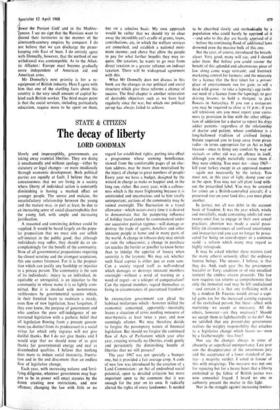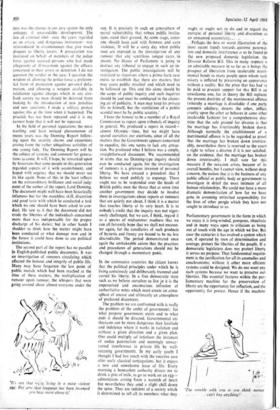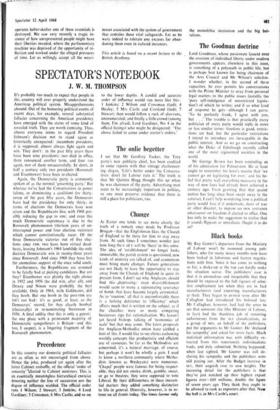The decay of liberty
STATE & CITIZEN
LORD GOODMAN
Slowly and imperceptibly, governments are taking away essential liberties. They are doing it unashamedly and without apology—either by statutory or legal changes—or more insidiously through economic development. Both political parties are equally at fault. I believe that the consciousness that we are living in a society where liberty of individual action is constantly diminishing is having a marked effect on younger people. The unrest and malaise, the unsatisfactory relationship between the young and the mature may, in part at least, be due to an increasing sense of social claustrophobia that the youpg feel, with ample and increasing justification.
A reasoned and convincing defence could be supplied. It would be based largely on the popu- lar proposition that we must sink our selfish self-interest in the public good; that although individuals may suffer, they should do so un- complainingly for the benefit of the community. Now of all governmental propositions requiring the closest scrutiny and the strongest scepticism, this one comes foremost. For it is the proposi- tion which can justify any hardship or injustice to a private person. The community is the sum of its individuals: injury to an individual, in- equitable or unrequited, is an injustice to the community in whose name it is so lightly com- mitted. But it is invoked with monotonous ruthlessness by governmental systems which, in their frenzied haste to maintain a steady, even flow of new legislation, have forgotten, if they ever knew, the purpose of government and who confuse the pure self-indulgence of un- restricted legislation with a pathetic belief that all legislation flowing from a present govern- ment (as distinct from its predecessor) is a social virtue for which only ingrates will not give dutiful thanks. But I do not give thanks and I would urge that we should none of us give thanks for governmental energy and zeal as disembodied qualities. I believe that nothing does more to induce social insecurity, frustra- tion and in the end discontent than an endless flow of legislative change.
Each year, with increasing volume and terri- fying diligence, whatever government may hap- Pen to be in power will enact statutes by the dozen creating new restrictions, and new offences; changing the law with little or no
regard for established rights; putting into effect a programme whose seeming beneficence, viewed from the comfortable pages of an elec- tion address, may be more than neutralised by the injury of change to great numbers of people.- Every year we have a budget, designed by the wizard in charge to make us happier and, in the long run, richer. But every year, with a callous- ness which is the more frightening because it is unintended and unconscious and to him totally unimportant, sections of the community may be ruined overnight. The fluctuation in a travel allowance—which occurs every time it is desired to demonstrate that the pampering influence of holiday travel cannot be countenanced under our successive puritan regimes—will damage or destroy the trade of agents, hoteliers and other innocent people at home and in many parts of the world. A change in tobacco duty may enrich or ruin the tobacconist; a change in purchase tax teaches the furrier or jeweller to know better than to indulge the appetite of luxury when austerity is the keynote. We may ask whether such fiscal caprice is either just or even sane. Can a society regard itself as well-ordered which damages or destroys innocent members overnight—without a word of warning or a word of regret—or a whisper of compensation? Can the injured members regard themselves as living in circumstances of guaranteed freedom?
In extenuation government can plead the habitual misfortune which—however skilled the economist concerned, apparently—inevitably leaves a situation of crisis needing measures of near-hysteria at least twice a year, and now seemingly oftener. We may therefore decide to forgive the peremptory nature of financial legislation. But should we forgive the continued flow of Acts of Parliament which year after year, creating virtually no liberties, erode gently and persistently the diminishing bundle of liberties that we still possess?
The year 1967 was not specially a bumper one, but it provided a fair average crop. A code of new law was introduced by the creation of a Land Commission : an Act of undoubted social potential, open to detailed criticism but more important open to the comment that it was enough for the year on its own. It radically altered the rights of every landowner. It needed
to be absorbed slowly and methodically by a population who could barely be apprised of it —and who to this day are barely apprised of it —before the continuing flood of additional laVvs drowned even the massive bulk of this one.
But the year, of course, introduced the breath- alyser. Very good, many will say, and I should echo them. But before you could savour the benefit of this splendid and adventurous piece of law along came wage restraint; and livestock marketing control for farmers; and the necessity for a licence (for the first time) for a private place of entertainment run for gain; to sell a dead wild goose—to take a lapwing's egg (with- out need of a licence from the lapwing); to give driving lessons; to hold a shotgun; to pick flowers in Antarctica. If you run a restaurant
you may be required to close at 11 p.m.; if you sell television sets you must report your custo- mers (a provision in line with the other obliga-
tion of addiction for a doctor to report his drug addict patients—regardless of the relationstwp of doctor and patient, whose confidence is a long-hallowed tradition of civilised living). Statute required you to keep away from pirate
radio—in terms appropriate for an Act as high treason—since to bring any comfort by way of victuals or other aid was an offence in itself, although you might mercifully rescue them if - they were sinking. You must not—since 1967— kill your turkey except in an approved manner
—again not necessarily by the turkey. You must not, in this year of light, dump your car in the open. You may not sell plant food with- out the prescribed label. You may be arrested for crime on a British-controlled aircraft; if a preserved tree on your land dies, you must plant another.
In justice, not all was debit in the account book of freedom. It was the year which, wisely and mercifully, made consenting adults (of over twenty-one) free to engage in their own sexual practices; abortion was made a social possi- bility (in circumstances of confused uncertainty and insecurity) and you can no longer be prose- cuted for being an eavesdropper or a common scold—a reform which many may regard as highly retrograde.
It may be asked whether these matters (and the many others) seriously affect the ordinary human beings. The answer, I believe, is that they do. And, each year (be the government Socialist or Tory; coalition or of one unsullied texture) the endless stream proceeds. The law now requires tax returns so comprehensive that only the immortal soul may be left undisclosed —and certain it is that any trafficking with it by a modern Dr Faustus would attract a capi- tal gains tax for the increased earning capacity of his revitalised person; but these—albeit with muttering—we accept as necessary. All the others, however—are they necessary? Should we accept them as lightheartedly as we do? Are we satisfied that any present-day government realises the weighty responsibility that attaches to a legislative change which leaves us—even by a featherweight—less free?
Nor are the changes always in areas of obscurity or superficial unimportance. Last year saw the disappearance of the unanimous jury and the acceptance of a lower standard of jus- tice—a majority verdict. I voted in favour of
this with misgivings. The measure was not one for rejoicing but for a heavy heart that a liberty enshrined in the fabric of British justice was now somewhat frayed. I heard no one in authority present the matter in this light.
Nor in the struggle against increasing lawless- ness was the change in our jury system the only unhappy if unavoidable---development. The law of criminal libel---over the years regarded as an erratic and dangerous instrument- was reintrodUted in -circumstances that give much disquiet to liberty lovers. A prosecution was instituted on behalf of members of the police force against accused persons who had made allegations of ill-treatment against the officers concerned in their arrest or detention. I do not question the verdict in the case. I question the wisdom of allowing the police force a preferen- tial form of protection against personal defa- mation, and allowing a weapon available in retaliation against charges which in any civi- lised society no man should be deterred from making by the introduction of new penalties and new sanctions. I made a solitary protest against this at the time when it happened. The practicie has not been repeated and it is my earnest hope that it will not be repeated.
In the field of personal reputations the most startling and least noticed phenomenon of recent years was the Denning Report follow- ing upon the security alarms and excursions arising from the rather ubiquitous activities of one young lady. The Denning Report will be the subject of scrutiny and comment for genera- tions to come. It will, I hope, be remarked upon by historians that some people in this generation regarded aspects of it with astonishment, and hoped with urgency that we should never see its like again. None of this in the least reflects on the extraordinary brilliance and social judg- ment of the author of the report, Lord Denning. The document might well have been historically infamous but for the matchless skill, discretion and good taste with which he conducted a task which no one should have been asked to con- duct. He saw to it that the document did not erode the liberties of the individuals concerned more than was indispensable for the proper discharge of his duties; but in other hands I shudder to think how the matter might have been conducted or what damage now and in the future it could have done to our political institutions.
The second part of the report has no parallel in English-published public documents. It was an investigation of rumours circulating which affected the honour and integrity of public life. Many may have forgotten the low point of public morale which had been reached at the time of these matters, the multiplication of rumour upon rumour, the whispers that were going around about almost everyone under the not.that wCre,,living in a more violent „me. Hrrt trove., Gat, language. has been, invented- you hear more about it:
sup, .1.1 is .precisely in such . ap atmosphere of moral vulnerability. that, robust public institu- tions stand their ground. At, some stage, some- one should ,h aye said with firmness .and even violence, 'It will be a sorry day when public men are exposed. to the investigation of any rumour that any scurrilous tongue cares, to invent. No House of Parliament is going to instruct any tribunal to engage in such an in- vestigation. The public investigations will be restricted to situations where a prima facie case exists to establish that there are matters that may cause public mischief and which need to be followed up. This and this alone should be the scope of public inquiry and such inquiries should be and must be conducted in the cleans- ing air of publicity. A man may keep his private life to himself, but the ventilation of a public scandal must be by public scrutiny.'
I have the, honour to be a member of a Royal Commission to report upon tribunals of inquiry in general. We produced a report in record— almost Olympic—time, but we might have spared ourselves our exertions, since of all the matters that the Government appears concerned to expedite, this one seems to lack any attrac- tion. We produced what I believe was a simple, straightforward document. We recommended in terms that no Denning-type inquiry should ever be conducted again, for the investigation of rumours is a grievous invasion of personal liberty. We have created a precedent that I believe we need publicly to expunge. There ought not to be suspended over the heads of British public men the threat that at some time another government may decide to involve them in investigations about reports or rumours that are quietly put about. I think it is a matter that touches liberty at its very heart. It is to nobody's credit that the inquiry was not vigor- ously challenged, but we can, I think, regard it as a species of midsummer madness that we can all fervently hope that we shall not encoun- ter again, for the corollaries of such products of hysteria and frenzy are bound to be no less discreditable. The period demonstrated once again the unshakeable axiom that the practices and procedures of generations should not be changed through a momentary panic.
In the communist countries the citizen knows that the political principles under which be is living consciously and deliberately trammel and curtail his liberty. In a free democratic state such as we believe ourselves to live in it is the unperceived and unconscious intrusion of authoritative notes which must create an atmo- sphere of unease and ultimately an atmosphere of profound discontent.
The problem we are confronted with is really the problem of the ambit of government: for what purpose government exists and to what ends it should be directed. Governmental en- thusiasm can be more dangerous than lassitude and indolence where it works in isolation and without a given direction and a given plan. One could multiply ad infinitum the instances of undue paternalism and seemingly unwar- ranted interference in private life by well- meaning governments. In my early youth I thought I had lost touch with the vocative case after early classical conjugations, but it enjoys a new and unwelcome lease of life. Every morning a benevolent authority directs me to drink a pint of milk, to go to work on an egg— admonitions arising from a warmth . of heart but nevertheless they send a slight chill down the spine. They are redolent of a society which is determined to tell all its members what they ought, or ought. not-to do..and _to. regard -The ;NerciSe, of personal liberty and, discretion: as an unwanted ecc.entricity-...
„Perhaps, the .best. or worst of - the most recent trends towards . extreme paternal- ism and domestic interference is to be. found in the new proposed domestic legislation. the Divorce Reform Bill. This in many respects is an admirable measure in so far as it brings the prospect of liberation_ from intolerable matri- monial bonds to many people upon whom such misery is inflicted by preserving an appearance without a reality. But the price that has had to be paid to procure support for this Bill is an unwelcome one, for in theory the Bill replactis the present doctrine of the matrimonial offence (whereby a marriage is dissoluble if one party commits adultery, deserts the other, inflicts cruelty upon the other or behaves in some other intolerable fashion) for a comprehensive doc- trine that the sole ground for divorce is that the marriage has irretrievably broken down. Although normally the establishment of a matrimonial offence is to be regarded as proof that the marriage has broken down irretriev- ably, nevertheless there is reserved to the court a right to refuse a divorce if it is not satisfied, on the evidence, that the marriage has broken down irretrievably. I shall vote for this measure if the occasion arises, because of its overall benefits, but I cannot view, without deep concern, the notion that it is the business of any public official or public body or government to investigate in detail the most intimate of all human relationships. We could not have a more dramatic demonstration of how far we have gone in assuming uninvited responsibility for the lives of other people which they have not sought to introduce to us.
Parliamentary government in the form in which we enjoy it is long-winded, pompous, ritualistic and in many ways open to criticism as being out of touch with the age in which we live. But over the centuries it has evolved a system which can, if operated by men of determination and courage, protect the liberties of the people. If a democratic legislature does not protect liberty it serves no purpose. That fundamental require- ment is the justification for all its anomalies and anachronisms; without it other more efficient systems could be designed. We do not want any such systems because we want to preserve our liberties. The essential features within the par- liamentary machine for the preservation of liberty are the opportunity for reflection, and the opportunity for protest. Hence if the machine 'Tice trouble with you is, you think- mono . can't buy.anythingr operates helter-skelter one of these essentials is destroyed. We saw very recentry a tragic in- stance of how unrepresented people might have their liberties invaded, where the parliamentary machine was deprived of the opportunity of re- flection and worked under the alleged pressures of time. Let us willingly accept all the weari- nesses associated with the system of government that contains these vital safeguards. Let us be wary indeed to tolerate any excuses for 'aban- doning them even in isolated instances.
This article is bated on a recent lecture to the British Academy.












































 Previous page
Previous page